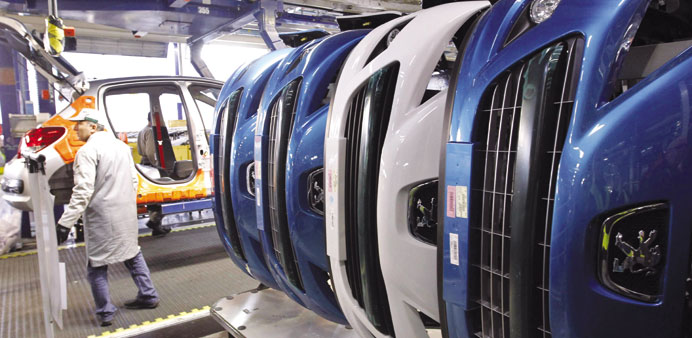Radiator grilles of Peugeot 208 are arranged as employees work on an assembly line at a PSA Peugeot-Citroen plant in Poissy, near Paris (file). The French car market jumped 9.4% in December as PSA took 10.6% and Renault 37.9%, but registrations of new cars in France fell in 2013 by 5.7%.
Increased December car sales in both France and Spain prompted cautious optimism for the European car market, which looks set to suffer a sixth straight annual decline to a two-decade low.
Hit by the financial crisis and resulting economic slump, the European auto market is set to contract by 25%, or 4.3mn vehicles, from 2007 levels, analysts at Moody’s Investors service said.
But yesterday’s data, with new registrations in December up 9.4% in France and 18.2% in Spain, was greeted by the industry as a sign that the decline has bottomed out.
“We come in to 2014 with a little more optimism and with a resolution that most of our companies move in to the black and maintain employment levels,” said Jaume Roura, head of Spanish car dealers’ association Faconauto.
The surge in French car sales in December was largely thanks to a 38% jump in registrations by Renault, data supplied by industry association CCFA shows.
In Spain, Peugeot topped new sales, registering 5,333 new vehicles in December, helping new car sales to turn positive for the full year.
Car sales in Spain rose 3.3% in 2013, rebounding from a 13.4% drop in 2012, car manufacturers’ association Anfac said yesterday.
Arndt Ellinghorst, automotive analyst at ISI Group said was also optimistic.
“There is strong evidence of a recovery (for European car sales), driven by low financing costs, improved residual values and used car prices and much better fuel economy of new cars.”
Moody’s Investors service expects demand for light vehicles to grow 3% in Western Europe in 2014 after a 5% slump in 2013.
New automobile registrations rose from the previous year by 3.3% to 722,703 in 2013, after plummeting by 17.7% in 2011 and another 13.4% in 2012, the National Association of Automobile and Truck Manufacturers (ANFAC) said in a statement.
“Without doubt the main players in 2013 were the incentive plans put in place by the Spanish government,’ ANFAC said in a statement.
“Nevertheless, the volume for the year is still low considering the potential of the Spanish market,” ANFAC spokesman David Barrientos said.
In October 2012, the Spanish government offered new car buyers rebates of thousands of euros each if they scrapped their old vehicles. The programme, a lifeline to the industry, was recently extended for a fourth time with an extra budget of €70mn ($96mn).
“For showrooms, we cannot say we have had a good year,” said Jaume Roura, head of the Federation of Automobile Showroom Associations.
“Our networks are prepared to sell more than amn cars and the few more than 700,000 registrations in 2013 remain far from our expectations,” he said in a statement.
In 2007, the last year of a decade-long property boom that imploded with disastrous economic consequences, Spain sold 1.7mn new cars.
“It shows that the economic recovery will take some time to reach families and translate into consumption,” said Juan Antonio Sanchez Torres, head of the National Association of Motor, Repair and Parts Sellers.
He pleaded for the government to announce quickly an extension of the scrapping subsidies so as to end any uncertainty in the automobile market.
“However, economic fundamentals do not yet indicate a sustainable upward trend,” Moody’s analyst Falk Frey said in a note.
Yesterday’s data showed that in France car sales slumped 5.7% in 2013, the country’s CCFA industry association said.
Nonetheless, the French car market is expected to be stable in 2014, Renault’s French sales chief Bernard Cambier told BFM Business TV.
However, even a return to sluggish growth will do little to alleviate chronic excess capacity that has built up along with regional losses, industry officials warn.
“We’re still in a very weak market,” said CCFA spokesman Francois Roudier. The coming year should bring stability at a very low level, he added.
The surge in car sales mirrors growth in manufacturing across the eurozone.
Markit’s Eurozone Manufacturing Purchasing Managers Index (PMI) rose to 52.7 in December from November’s 51.6, confirming an early estimate and marking its best reading in 31 months.

